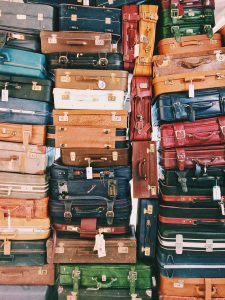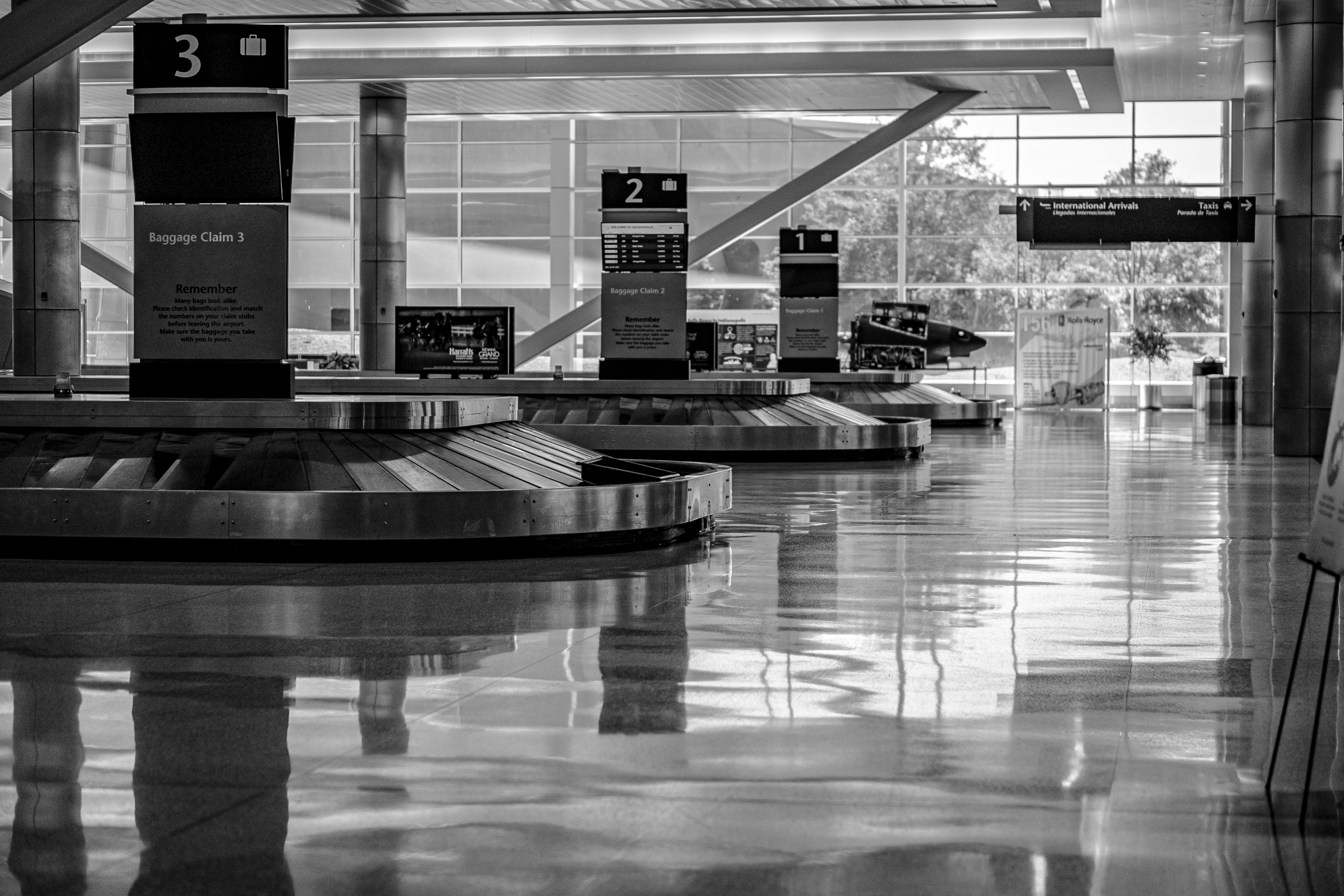When it comes to air travel, airlines have a lot of responsibility. But fundamentally, it all boils down to getting you and your belongings safely from Point A to Point B. So what are the airline baggage policies, and what rights to flyers have when it comes to lost, delayed or damaged baggage?
Most of time the airline gets it right; you and your bags arrive at the same time – on time and intact. In 2020, the US Bureau of Transportation Statistics reported that airlines mishandled 4.11 bags per 1,000 checked bags, a success rate of 99.6%. Still, things can go wrong; the same report says that the total number of mishandled bags by US carriers was just under 900,000 in 2020! There’s nothing worse than standing at the baggage carousel after a long flight waiting for a bag that does not come down the shoot, or it does come down but is damaged.
In this article we’ll focus on your baggage, and what your rights are to ensure that the airline makes it right when things do not go as planned. Topics we’ll cover:
- Delayed bags
- Lost bags
- Damaged bags
- Bags with missing items
- Limits to an airline’s liability for damaged or missing items
- The “final carrier” rule
- Baggage selection and packing tips
Note: This post assumes travel within the US. Baggage rules for international travel can differ, and we’ll cover that topic in a future blog post.
Delayed Baggage
A delayed bag is just that – a bag that does not arrive on time with its owner. It’s the most common baggage problem, and the one that’s the easiest and quickest to resolve.
Even if you only travel occasionally, chances are that you have experienced this. Maybe there just wasn’t enough time for your bag to make the connection when you had to change planes on your way to your final destination, or a transfer from one airline to another didn’t happen as quickly as expected. Whatever the reason, your bag still made it to your final destination – just a bit later than you did.
If your bag did not come off the plane with the rest of the luggage from your flight, the first thing you should do is find the bag claim office at the airport for the airline you flew in on and speak to a bag claim rep. Although not always the case, the rep will likely already know what happened (they might have even paged you instead of having you wait at the baggage carousel), be able to advise you on when your bag is expected to arrive at the airport and will give you a timeframe for delivery.
Compensation for Delayed Baggage
The airline will sometimes offer you a toiletry kit or authorize expenses for you to meet your immediate needs. Your bag gets delivered to you a few hours later, or maybe the next day, and everybody moves on with life. Easy-peasy.
Lost Baggage
But what happens when it is clear that your bag is not showing up any time soon? When does a “delayed” bag turn into a “lost” bag?
How Airlines Reunite Passengers with Lost Baggage
It varies by airline, but generally a bag will move into the “lost” category when it’s been delayed for 3 to 5 days. Until then, the local airport is still trying to return your bag to you – routing the bag based on its tagged destination or any other instructions in the claim.
After 3 to 5 days, the claim will usually be transferred from the local airport to a centralized baggage service office at the airline, and you’ll be given further instructions. Any unclaimed bags are sent to this office after about 5 days as well.

Lost & unclaimed luggage are sent to a centralized baggage service office
Here, specialists trained specifically in locating missing bags will take up the case. They may have you fill out a more detailed claim, and they use a worldwide database shared by most airlines to try to hunt down your stuff. At the same time, they are inventorying unclaimed bags that they have received and attempting to match bags with owners.
If it’s something simple, perhaps another airline ended up with your bag by mistake, the process can sometimes be concluded in a week or two.
But it can often take longer. For example, if the routing tag was accidentally torn off of a bag and there’s no identifying information on the outside, the bag can’t be reunited with its owner until its contents have been examined. This includes a complete inventory of the bag’s contents, as well as a thorough search for identifying information.
Bag specialists can be quite resourceful in tracking down a customer based on its contents. If they find a prescription bottle, they’ll call the pharmacy to try to reach the customer. If they find a library book, they’ll call the library.
This process is a very manual one and can take up to a couple months to complete. It takes time for bags that have lost their owners to be properly inventoried. The best tips here are to keep in contact with the airline by reaching out once a week or so, be responsive to any request for additional information, and pack your patience. Don’t be discouraged if you don’t see movement on the search for your bag in the first week or so. There is actually a “sweet spot” 4 to 6 weeks after a bag goes missing where most bags are matched with their owners and returned.
Compensation for Lost Baggage
Similar to the delayed bag, the airline will authorize interim expenses if there were items in the bag that you need immediately. But keep in mind any expense paid out will be deducted from any final settlement if your bag is not located.
If the airline is not able to locate your bag after their search, they will assess your claim and pay you out for the missing items. Similar to an insurance claim, they will pay you for the depreciated value of the items (not what you paid for them), and they could ask for receipts for pricier items. Also, the amount an airline is on the hook for is capped by the US Department of Transportation. Currently the limit is $3,500 per passenger for domestic flights and is also subject to the airline’s limits of liability.
If you are still unsure about how to handle a delayed bag or feel that the airline owes you more for expenses incurred due to late delivery of your luggage, our staff at Trip Tiger would be more than happy to handle things for you. Just follow this link to our website to get started.

Trip Tiger can handle your luggage compensation claim
Damaged Baggage
If your bags or belongings are damaged, you generally have 24 hours to report the damage to the airline. If the damage is not exempt in the airline’s limits of liability (a big if), the airline will pay to have the item repaired, or they will pay you the item’s depreciated value if it can’t be repaired.
Bags with Missing Items
While its uncommon, nothing can feel more violating than discovering that something is missing from your bag after a flight. Similar to damaged bags, airlines typically require the reporting of missing items within 24 hours. Also similar to damaged belongings, if a missing item is not exempt in the airline’s limits of liability (again, a big if), the airline will pay you the item’s depreciated value. If it’s a pricy item, they may ask to see a receipt for the original purchase.
Limits to an Airline’s liability for Damaged or Missing Items
If you read our airline compensate article, you already know that airlines use the Contract of Carriage you agree to when you purchase your ticket to limit their financial responsibility for most problems. This includes issues with your baggage.
The contract words may differ slightly from airline to airline, but the premise is generally the same. Take Delta’s Contract of Carriage as an example. Delta doesn’t take any responsibility for preexisting damage, minor damage, “normal wear and tear”, fragile items, precious items, or perishable items. If any of these types of items are lost, missing, or damaged, you’re out of luck.
Delta is not alone here. Every airline has similar provisions in their Contracts of Carriage. The good news is, Trip Tiger can also help you with your damaged luggage claims! Start your case here.

Your old suitcase may not be eligible for compensation
The “Final Carrier” Rule
Unless you’ve encountered this rule for yourself, you probably don’t know what we’re referring to here, and if you have experienced it, it likely seemed strange. The rule is simple: If a customer travels on more than one airline, it’s the responsibility of the final airline in the customer’s journey to handle any bag claim to conclusion. The rational for the rule takes a bit of explaining.
First, since they are the last ones to see the customer in person, the final carrier is in the best physical position to take the claim from the customer in person in the baggage claim area at the final destination.
The rule also ensures that there is only one airline trying to route the bag to the customer when a bag is delayed or missing. The responsible airline can coordinate with the other airline as necessary, but if another airline is also actively attempting to route the bag through their system it can cause a tug-of-war between the two carriers that often only leads to further delay.
When a bag is damaged or items are missing, having the final airline handle the claim also prevents somebody from double dipping and filing a claim with multiple airlines.
The final carrier rule isn’t meant to assign blame to one airline or the other (the airlines have a behind the scenes process for that); the intent is to resolve the claim with the customer as quickly, consistently, and efficiently as possible.
Baggage Selection and Packing Tips
While you are largely at the mercy of the airline when it comes to baggage handling, there are things that you can do to reduce the chance that you will encounter a problem.
Selecting the right bag is critical. It really comes down to personal preference, some common sense, and weighing pros and cons.
- When selecting a bag, it’s always a good idea to pick something that’s somewhat distinctive. Every black rollaboard looks the same at baggage claim, so try to pick a unique color or feature to reduce the chance that somebody takes your bag by mistake.
- Avoid flimsy or protruding features. Four wheeled bags are great for navigating through a busy airport terminal, but those protruding wheels break easily. Not surprisingly, broken wheels are almost uniformly exempt from airline liability. We recommend that you limit your four wheeled bag to your carryon where mobility and convenience are more important. Stick with the enclosed two-wheel bags for checking.
You can also reduce the risk that you bag is lost or damaged by following these tips when packing:
- Avoid checking fragile items, anything of value, or anything that you absolutely can’t do without in the event your bag is delayed. Think prescription medications, car keys, electronics, fragile souvenirs, travel documents, money, and important paperwork. Ideally your checked bag contents should be limited to replaceable items such as clothing, liquids you can’t carry on, and toiletries.
- If you do need to check something that might be a bit fragile, a hard-sided suitcase is your best bet. However, it’s more common to see damage to a hard-sided suitcase than a soft one, so you are trading potential damage to your hard case in order to protect the contents.
- To help you reunite with your bag if it’s delayed or lost, be sure that there is a luggage address tag on the outside of the bag. It’s not necessary to put your address on the tag – and that’s not advisable anyway since it could give a would-be criminal the address of somebody they know isn’t home. Just your name, phone number, and maybe email address will suffice. Even better – when packing, include a piece of paper containing your contact information inside of your bag as well.
Conclusion
When it comes down to it, checking a bag with an airline really is quite safe. The odds of a problem are pretty low, and when a problem arises, they are often resolved quickly and easily. But, when that doesn’t happen, there is a process available to settle your claim, and there are things that you can do to mitigate the risk of something going wrong. Of course, Trip Tiger is always here if you need assistance with a baggage issue.


